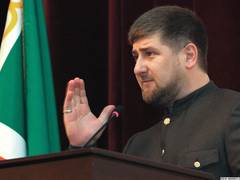Disagreements Over Finances Emerge between Moscow and Chechen Government
Publication: Eurasia Daily Monitor
April 22, 2010 02:55 PM

Chechen President Ramzan Kadyrov,
Over 5,000 Chechen families have not received compensation earmarked by the Russian government for those who lost their homes and other property during the war. On April 20, Chechnya’s finance ministry promised to disburse the payments by the end of 2010, but it was unclear whether this would be possible. The ministry cited numerous attempts to abuse the system, which had forced them to proceed with the disbursals very cautiously. According to the Chechen ministry, the federal government allotted $100 million for compensation payments to be made this year (www.kavkaz-uzel.ru, April 20).
The beginning of this process dates back to 2003, and since then the amount of compensation has not been changed even though prices have significantly increased. The government pays $10,000 for a lost home and less than $2,000 for other lost property. "The authorities have not been able to decide who to pay this money to for the past seven years,” a resident of Chechnya told the Kavkazsky Uzel (Caucasian Knot) website, adding: "In 2003 it was possible to do something for $12,000, but today it is not enough even to build a hut or lay the proper groundwork for a house. State functionaries and swindlers received money, while those who had really lost everything are still waiting for that money.” Some also expressed their resentment against Moscow’s alacrity to spend funds on foreign territories like South Ossetia when Russia’s own citizens, Chechens, were denied access to reimbursements for their lost property (www.kavkaz-uzel.ru, April 20).
Kavkazsky Uzel noted two cases in which banks and state officials were accused of fraud in dealing with compensation issues. One of the accused received a year and a half imprisonment, while the other implicated group of officials was not sentenced at all.
In the spring of 2008 the price of a two-bedroom apartment on the outskirts of Grozny averaged $50,000-60,000 and the average price per square meter reached $500 (www.grozny-inform.ru, March 11, 2008).
As Russia is still experiencing tight financial conditions and trying to cut back on its expenses, the new presidential envoy in the North Caucasus, Aleksandr Khloponin, and Chechen President, Ramzan Kadyrov, clashed during a meeting between the leaders of the North Caucasus republics held on April 20. Khloponin raised the issue of payments for electricity consumption in the North Caucasus, pointing to a huge payment backlog of nearly $500 million, most of it in Chechnya. Kadyrov responded with counterclaims, stating that Chechnya was not responsible for the debts incurred during the war from 1999-2005. According to Kadyrov, most of the debt derived from that period. At the same time, he acknowledged that economic hardships make paying the electricity costs prohibitively expensive for Chechnya’s jobless residents, the number of which he estimated at 300,000. In addition to electricity payments, Chechnya still has a backlog of payments for natural gas supplies which, according to Chechen officials, date back to 1993, when Dzhokhar Dudaev was president of the de facto independent Chechnya (Kommersant, April 21).
It is especially hard to make ends meet in Chechnya given that the 2002 census and later population estimates are widely assumed by experts –and even by some Russian officials– to be flawed. In 2002, the Russian official that led Chechnya’s reconstruction efforts, Vladimir Yelagin, said that the population of 1,088,000 recorded in the 2002 census was "unrealistic,” suggesting instead that no more than 850,000 people were living in the republic. In 2000, the Danish Refugees Center estimated there were slightly less than 800,000 people living in Chechnya. Experts said that even if all refugees returned to Chechnya, including not only ethnic Chechens, but also numerous groups of ethnic Russians and Armenians, the number of residents would be less than 1,088,000 (www.demoscope.ru, October 24, 2002). Still, the population figure subsequently grew even further, and the official Russian estimate of Chechnya’s population in January 2010 was 1,268,000 (www.gks.ru, accessed on April 21).
Officials provided two explanations for the sudden rise of Chechnya’s population after two devastating wars. One was that the number of Chechens was artificially kept down during the communist period, and the other was that Chechnya has very high birthrates. Alexander Cherkasov of the Memorial human rights center said it was impossible to hide hundreds of thousands people for years after the Soviet Union collapsed in 1991 (www.demoscope.ru, October 24, 2002). Even though officially Chechnya enjoys the highest birthrate in the Russian Federation, given the state of the economy and healthcare, and war related shocks, it is highly doubtful that the reproductive capabilities of the general population were not negatively affected. Cherkasov put the real figure of Chechnya’s population at 600,000 in 2002.
According to the 1989 census, Chechnya and Ingushetia’s combined population was 1,270,000, out of which ethnic Chechens and Ingush comprised 900,000 (www.demoscope.ru, September 11, 2005). The overall population of ethnic Chechens in the USSR was around 957,000 in 1989, so there were a relatively small number of potential immigrants from other parts of the former Soviet Union.
In 2002 and ever since, Moscow has been eager to show that Chechnya’s population did not dramatically decrease as a result of two wars and the ensuing hardships inflicted on the republic. Chechnya’s pro-Moscow government also had an interest in having inflated population numbers in order to be able to demand more funds to cover the provision of services to those people. So, both interested parties reached a deal. Now, however, when more thrifty times have arrived, Moscow may be prompted to do something about the suspiciously high birth rates and what appears to be a massively inflated population statistic. This dispute appears to be increasing already tense ties between Aleksandr Khloponin and Ramzan Kadyrov and could further exacerbate the worsening security situation in the region.
http://www.jamestown.org/programs/ncw/single/?tx_ttnews[tt_news]=36296&tx_ttnews[backPid]=24&cHash=6596a9d8ab






















